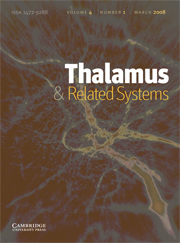Article contents
The sleep state-dependent midlatency auditory evoked P50 potential in various disorders
Published online by Cambridge University Press: 18 April 2006
Abstract
The P50 potential is a midlatency auditory evoked response which is sleep state-dependent, habituates rapidly and is blocked by the muscarinic cholinergic antagonist scopolamine. It is thought to be generated, at least in part, by ascending projections of the reticular activating system. The amplitude of the P50 potential can be used as a measure of level of arousal, while the degree of habituation to repetitive stimulation can be used as a measure of sensory gating. We studied these processes in three conditions which show sleep-wake cycle dysregulation and attentional disturbance, but differ greatly in their etiology, depression, Huntington’s disease and rotation-induced motion sickness. Subjects with depression and rotation-induced motion sickness showed significant decreases in the habituation of the second of paired evoked responses, while Huntington’s disease subjects showed decreased amplitude as well as decreases in the habituation of the second P50 potential. This waveform may represent the manifestation of pre-attentional processes, and may become a useful measure for monitoring the severity, progression and/or remission of disorders which affect these processes.
Information
- Type
- Research Article
- Information
- Copyright
- 2002 Elsevier Science Ltd
- 7
- Cited by

